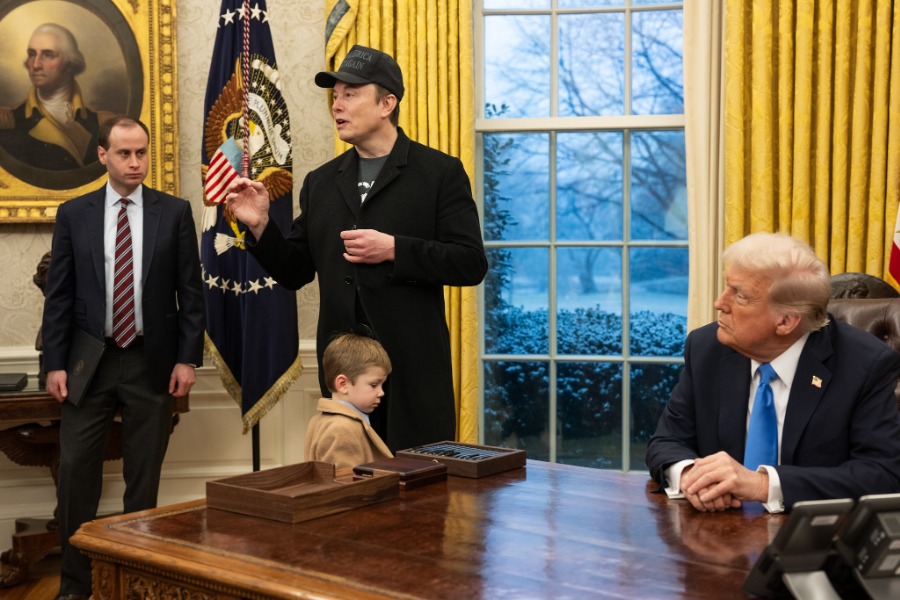The Syria War Powers Memo: Why It Matters
Last Friday, Feb. 9, Sen. Tim Kaine asked the Trump administration to turn over a legal memo prepared by administration lawyers in connection with the April 2017 missile strikes directed at Syrian regime forces. The existence of that memo came to light in response to a freedom of information lawsuit filed by our organization, Protect Democracy.
Published by The Lawfare Institute
in Cooperation With

Last Friday, Feb. 9, Sen. Tim Kaine asked the Trump administration to turn over a legal memo prepared by administration lawyers in connection with the April 2017 missile strikes directed at Syrian regime forces. The existence of that memo came to light in response to a freedom of information lawsuit filed by our organization, Protect Democracy. One of us wrote a post on Lawfare last spring explaining why we were filing the suit. Sen. Kaine’s letter received considerable coverage (for example at NBC, the Washington Post, and The Hill), and over at National Review, David French has joined the call to “release this memo.” Because this issue is garnering so much attention, we wanted to provide an update on how we learned about this memo and why it matters.
How and what did we learn about this secret memo?
On April 6, 2017, the administration announced it had conducted airstrikes on Syrian regime targets in response to the Assad regime’s use of chemical weapons. While all were rightly outraged by the brutality of Assad’s attacks, we were left wondering what the Trump administration’s legal authority for this action was under domestic or international law. While the authority to initiate military conflicts has been shifting from Congress to the Executive for decades, this situation seemed unusual: President Trump ordered strikes on a sovereign nation (albeit a despicable one) without any authorization from Congress, without any U.N. Security Council resolution, and when there had not been an attack or imminent attack on the United States. So the day after the strikes, Protect Democracy submitted requests under the Freedom of Information Act (FOIA) to the Departments of Justice, State and Defense. We wanted to know whether the administration had conducted a legal analysis before this action—and if so what its legal justification was.
Although various administration officials took to the press to promote the strikes, it did not release to the public its legal justification, and so in May we sued. As one of us wrote here at the time: “In a democracy, the public should not be kept in the dark on the president’s views about his authority to initiate a new military conflict.” Then, while not responding to our FOIA request, the administration conducted more strikes against Syrian regime forces. Troubled that the administration was deepening the conflict while still not making public any documents about its legal authority, we asked the court for a preliminary injunction to move the case forward. The court granted our motion in part, finding that: “if production is unduly delayed, both Protect Democracy and the public at large will be ‘precluded . . . from obtaining in a timely fashion information vital to the current and ongoing debate surrounding the legality of’ a high-profile government action” and that “[b]eing closed off from such a debate is itself a harm in an open democracy.”
The court’s opinion did not require the government to turn anything over, but it did require the government to fast-track our request by disclosing what documents existed and its rationale for withholding them. The government listed its withheld documents on a Vaughn Index and provided a series of declarations from government officials describing the documents the government found and its claims to exempt them from public disclosure. Here’s what we learned.
First, the government acknowledged that administration lawyers wrote a 7-page memo on April 6. Second, the government’s declarations revealed that only a few words on a single page of that memo are classified. The classified material concerns only the factual background. None of the legal analysis is classified—not the legal standards at play are nor how the memo applies those standards to these circumstances. Third, we learned that the legal argument in this memo did not just apply to the April 2017 strike. According to the Justice Department, Attorney General Jeff Sessions was briefed on the contents of the memo the day after the strike—and the purpose of that briefing was to help the Attorney General understand how he would advise President Trump in “future military actions.”
Our litigation is ongoing, and even though the government acknowledges that the legal analysis in the memo is not classified, it is claiming that the memo is exempt from disclosure under FOIA exemption (b)(5). We’ll leave those issues to the court but interested readers can find the briefs here.
As we explain below, we shouldn’t need a court to force the administration to release its secret Syria memo. Other members of Congress should join Sen. Kaine in insisting on its release, and the administration should share it (with redactions of the relevant classified facts) for at least two reasons.
The Administration’s Views on Its Unilateral Article II Authority Matters for Other Conflicts
One reason the public needs to see the Syria memo is its relevance to ongoing and potential future military actions. The government has said the Attorney General was briefed on it for this reason. And the memo likely articulates the Trump administration’s views of its unilateral Article II power in a way relevant to ongoing or possible future U.S. military action in Syria, North Korea, or elsewhere in the world.
As readers of Lawfare know well, the Constitution divides war-making authority between Congress and the Executive Branch, and the lines of demarcation are contested and evolving. The Trump administration’s public comments about the April 2017 military strikes on Syria suggest that the administration has adopted a particularly aggressive view of the president’s authority. White House spokesman Sean Spicer claimed that the Constitution gives the president "the full authority to act" whenever military force is "in the national interest.” And a letter submitted to Congress declared that “The United States will take additional action, as necessary and appropriate, to further its important national interests.” Neither referenced Congress’s own role or of any legal limits on the president’s constitutional war-making authority.
The administration’s view of the president’s Article II authority to direct military action may guide the administration’s views of its authority to strike foreign regimes in other contexts. The Trump administration has been publicly weighing a “bloody nose” strike against North Korea and has released a strategy on Syria that calls for continued U.S. presence there. On Feb. 2, Defense Secretary James Mattis threatened Syria with further strikes if chemical weapons use continued. Syria has also seen continued engagement by U.S. forces, including further action against regime forces earlier this month.
To be sure, the different factual circumstances presented by the Assad regime’s use of chemical weapons, North Korea’s nuclear capability, and hostilities arising from the broader conflict in Syria each require different legal analyses. The precise legal basis for acting preemptively or in self-defense will not be the same as for responding to a humanitarian tragedy. And the Executive Branch has in the past considered the anticipated scope and duration of a conflict to be relevant to the president’s constitutional authority—an analysis that would vary in different circumstances.
But there are some commonalities that suggest the ongoing relevance of the April 2017 memo to the debates over North Korea and Syria today. Neither Congress nor the U.N. has authorized the use of military force in these situations. Neither involves responding to an attack on the United States or its citizens. Both involve counter-proliferation interests against WMDs. And, perhaps most significantly, in both Syria and North Korea U.S. military action is unlikely to be limited to a single engagement and is likely to provoke or lead to larger and ongoing conflicts—as we are seeing in Syria and experts anticipate could occur in North Korea.
We know that Executive Branch opinions on the legality of military action become new precedents, shaping how the administration construes its authority in the future. As Jack Goldsmith detailed on Lawfare:
The Executive branch, and most notably the Office of Legal Counsel, has through its legal opinions developed an elaborate set of constitutional justifications for unilateral presidential military action. These opinions are the view of one branch only, and are not the final word on constitutionality. And they construe presidential power very charitably—more charitably than many members of Congress and most scholars do, for example. But while OLC opinions are not the final word, they do provide a baseline for understanding the precedential significance of each new episode of presidential unilateralism.
If the Syria memo reveals an extreme view of presidential authority that does not recognize rule-of-law limits, Congress and the public need to know so that the legislature can reclaim its own constitutional authority. Congress may conduct further oversight (for example continuing the important hearings Sen. Corker chaired last year), or to legislate limits on the use of force in certain situations, along the lines of bills regarding preemptive war in North Korea or first-use nuclear strikes. Congress may also wish to explicitly authorize force in certain situations. As David French explains, “military action backed by robust debate and congressional authorization is far more sustainable—and threats backed by the approval of the legislative branch are far more potent—than strikes or threats based on presidential actions alone.”
Democracy Requires Transparency on the Legal Basis for War
There is an additional reason why the unclassified legal analysis in the Trump administration’s war powers memo should not remain hidden from the public. We live in a constitutional democracy. We entrust our elected representatives in the Executive Branch and the Legislature to make policy choices. But they are ultimately accountable to the public and must operate in accord with the law. And that requires sharing with the public the legal basis if the government takes the country to war.
In some situations, national security interests will require withholding certain information. But as the government acknowledges here, the legal analysis is not classified, and there is no national security interest in keeping the legal memo secret.
Because there is a strong democratic interest in the public understanding the legal justification for military action, and the legal analysis in many situations will not be classified. The Executive Branch has a fairly well established norm of making public its legal memos on the use of force in new areas. For example, in April 2011, the Obama administration released an Office of Legal Counsel memo on its authority for military operations in Libya, just as prior administrations had done for military actions in Iraq, Kosovo, Haiti and elsewhere (links to these and other examples are on page 14 of our brief).
The publication of these government legal opinions allow the public, scholars, and members of Congress and their staffs to assess the Executive Branch’s views of its legal authority and to respond. If the administration refuses to share its legal memos, the public and Congress are denied this understanding of the Executive Branch’s own views. If that occurs, the Executive Branch’s authority can become, in practice, limitless. Those outside of the Executive Branch have no way to assess what the legal justification is for any military action and whether it falls within or outside of established precedents.
For these reasons, Sen. Kaine is right to call on the administration to share its Syria legal memo, and other members of Congress should join that call. No action of our government carries greater weight than directing our military against a new adversary. By insisting on keeping the memo secret, the Trump administration is not only saying it may use legal force that has not been authorized by Congress, but also that it may do so without giving Congress and the public a meaningful oversight role. That goes too far—when the Executive Branch takes it upon itself to launch military operations against a new adversary, without Congressional authority, the least it can do is make public its legal opinion.
Full disclosure: Protect Democracy is also representing Lawfare’s editor in chief, Benjamin Wittes, in multiple other FOIA matters and in the filing of an amicus brief in the Foreign Intelligence Surveillance Court.






